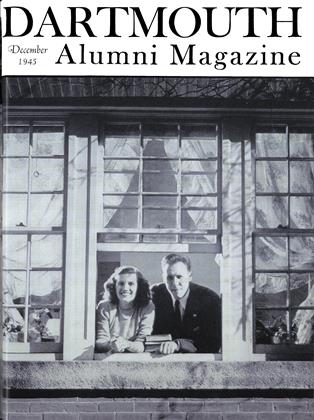by Albert R.Chandler 'OB. Cornell University Press, 1945.146 pp. $1.75.
Without much question, Alfred Rosenberg's Der Mythus des 20. Jahrhunderts was, next to Hitler's Mein Kampf, the most influential of all Nazi writings. Since Rosenberg's mammoth work of some seven hundred pages has never been translated into English, Albert R. Chandler, Professor of Philosophy at Ohio State University, has made a genuine contri- bution to the average American's knowledge of Nazi ideology. In this unpretentious little book, -Professor Chandler has not attempted an exhaustive analysis of Rosenberg's book. Rather he has tried to present a brief summary and some criticism of Rosenberg's chief ideas on race, religion, aesthetics, and the state.
Professor Chandler regards Rosenberg primarily as a fanatic, free from the grossness characteristic of many Nazi leaders. Obsessed with his hatred of the Jews and his belief in Nordic supremacy, however, Rosenberg has garbled his sources, taken quotations out of their context, and refused to admit his errors even when confronted with them. He is then intellectually dishonest.
Professor Chandler has drawn his material not only from the Mythus but also from several of Rosenberg's less well known works, from Catholic critiques, and from general works on Nazi Germany. Some of the most interesting sections in the book are those analyzing and criticizing Rosenberg's general philosophy, his conception of "honor" and his aesthetics. In his Epilogue Professor Chandler not only declares that an understanding of Rosenberg is necessary for an appraisal of Nazi Germany, but also states that his false ideas may serve as a warning to the United States against racial and religious prejudices.
The readers of the DARTMOTH ALUMNI MAGAZINE will be interested to learn that a recent donation has been made to the Baker Library by Roland M. Myers '28, of a large collection of Nazi books and pamphlets, including several of Rosenberg's works which apparently were not accessible to Professor Chandler.
 View Full Issue
View Full Issue
More From This Issue
-
 Article
ArticleTHE DEAN UNMASKED
December 1945 By HERBERT F. WEST '22, -
 Article
ArticleTHE VETERAN RETURNS
December 1945 By PROF. Wm. STUART MESSER, -
 Class Notes
Class Notes1945
December 1945 By ARTHUR NICHOLS, JOHN W. CALLAGHAN -
 Class Notes
Class Notes1917
December 1945 By MOTT D. BROWN, DONALD BROOKS -
 Article
ArticlePRESIDENT DICKEY INDUCTED
December 1945 -
 Class Notes
Class Notes1918
December 1945 By ERNEST H. EARLEY, DONALD L. BARR
Books
-
 Books
BooksMARKETING RESEARCH.
November 1952 By Albert W. Frey '20 -
 Books
BooksNINE SATURDAYS MAKE A YEAR.
OCTOBER 1962 By Cliff Jordan ’45 -
 Books
BooksDARE CALL IT TREASON.
MARCH 1963 By JOHN C. ADAMS -
 Books
BooksTHE DEVELOPMENT OF THE TREASURY 1660-1702.
November 1957 By JOHN R. WILLIAMS -
 Books
BooksSOCIETY AND SELF.
JULY 1963 By LLOYD H. STRICKLAND -
 Books
BooksTHE DECLINE OF AMERICAN LIBERAL-
April 1956 By ROBERT E. RIEGEL

